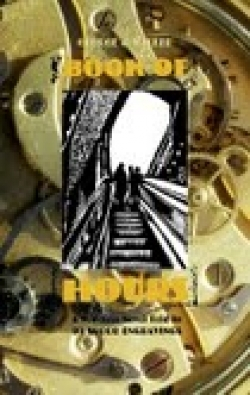Book of Hours
A Wordless Novel Told In 99 Wood Engravings
- 2010 INDIES Finalist
- Finalist, Graphic Novels & Comics (Adult Nonfiction)
The idea that all art is a reflection of reality is true for many reasons. After all, even the most reactionary art bears the dim but discernable negative imprint of the very thing that it strives to destroy, ignore, or reject.
A lesser known truth about art is that it generally works through an act of accretion. the steady accumulation and layering of information art generates interacts with its audience’s consciousness and willing suspension of disbelief. This, in turn, can lead to a miraculous transformation of that most insubstantial of substances, our dreams, into reality—even if it’s only for a moment, and only within the vaults of our imaginations.
Given that, how does an artist portray something that is, to its very core, a negation of the most cruel and final kind? How to capture artistically an event so horrific, so apocalyptic, that quite literally it signaled the end of life as we knew it?
How do you make art about 9-11? Hell, how can you even make art after that terrible September morn?
George A. Walker’s response is the Book of Hours, and it is eloquent, moving, and powerful.
Over the course of 99 wood engravings, Walker tracks the mundane activities of a small cast as they go about their daily routines in the 24 hours before they meet their untimely ends when those two towers fell. And then, just when we’ve experienced enough to see ourselves in these poor, doomed shadows, they’re taken from us. Essentially, Walker uses the very nature of how we understand art to drive home the true cost of that awful day in a visceral, personal manner.
Thus we’re faced with not just the end of all these people’s lives, but also of our collective world—real and imagined. It’s a realization that only heightens the bittersweet impact of Book of Hours.
Walker’s silent howl is an extended visual elegy delicately and boldly carved into the page by a sure, steady, and skillful hand. It’s a dirge for a way of life and a mindset destroyed in the most public and profound of ways. Book of Hours deserves a place next to Art Spiegelman’s brilliantly faulted In the Shadow of No Towers, Rick Veitch’s sublimely surreal Can’t Get No, and other worthy titles which explore the meaning, impact, and ramifications of that day.
Reviewed by
Bill Baker
Disclosure: This article is not an endorsement, but a review. The publisher of this book provided free copies of the book and paid a small fee to have their book reviewed by a professional reviewer. Foreword Reviews and Clarion Reviews make no guarantee that the publisher will receive a positive review. Foreword Magazine, Inc. is disclosing this in accordance with the Federal Trade Commission’s 16 CFR, Part 255.


